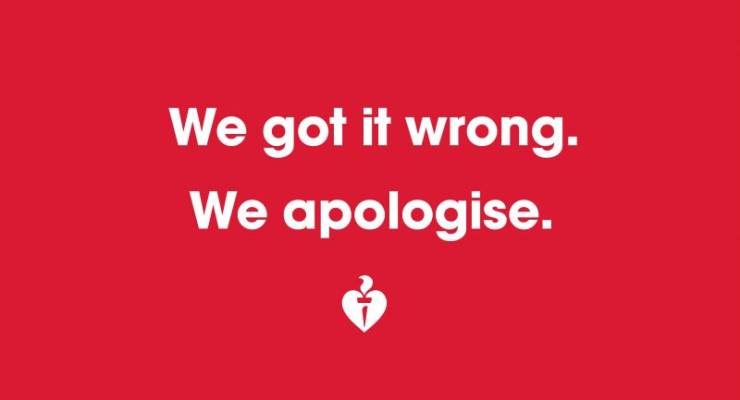
The Heart Foundation’s now-infamous “Heartless Words” advertising campaign is dead. The major campaign that stated that people who don’t look after their heart health don’t love their families led to public anger, an apology and finally a pulling of the plug.
The ads featured what has been labelled “cruel”, “hurtful” and “disgraceful” scenes of a dying woman lying in a hospital bed and telling her young daughter that she doesn’t care about her, and a young man telling his groups that he doesn’t care for them. It was designed to tug at the very organ the foundation wanted to draw attention to — the heart. But that tug ended up capsizing the whole campaign and creating a public relations disaster the foundation is trying to clean up.
Heart Foundation chief marketing officer Chris Taylor issued an apology, saying that the campaign was trying to highlight the emotional side of the disease but admitted they had “overstepped the mark slightly”.
“We were surprised by the emotional response from a section of the community. It was not our intention to upset people.”
But Taylor also said that he stood by the ad’s “confrontational” nature, saying that it was needed to shake off the complacency surrounding awareness of heart disease, the biggest killer in Australia.
“Since we launched, we’ve had over 20,000 people go online and complete our Heart Age Calculator to get a better understanding of their own personal risk of heart disease.
Taylor’s contradictory comments highlights today’s marketing landscape, where cutting through the noise of a highly saturated advertising landscape is key. Controversy is a popular tool — many intentional but some accidental. Some use sex or sexism in lazy, predictable ways; some use graphic images, and some rely on violence against animal-shaped paper mache.
It’s not easy to get people to pay attention to a public health message; it’s a thankless task and these messages are difficult to sell to a public constantly inundated with hundreds of ads every single day, especially ones that are far more palatable.
Government bodies and advocacy groups have long employed shock and controversy to grab people’s attention. Anti-smoking ads use highly graphic images to show the devastating impact of tobacco and safe driving campaigns consistently use emotion to try and change drivers’ behaviour in a bid to reduce the road toll.
What these types of campaigns, including the Heart Foundation’s, have in common is that they all use fear as motivation to challenge behaviours. But was it the right move? A 2017 James Cook University study revealed that this approach has limited success; study author Dr Rebecca Pedruzzi said instead of focusing on fear and emotions, campaigns focusing on challenging why people act in certain ways would be far more effective.
Taylor said “Heartless Words” was designed to follow in the footsteps of its previous “Serial Killer” campaign, which echoed the style of true-crime stories and placed heart disease in the role of the criminal. That ad, however, focused on the role that government’s play in funding and support, not individuals.
Taylor said the “Serial Killer” campaign had been well received and expected “Heartless Words” to do the same.
Although the campaign barely lasted a week, you can’t argue that it hasn’t been successful. The public reaction was swift; people who lost loved ones to heart disease or survived the disease themselves took to social media with anguish and anger. And in doing so, it became that rare beast — a genuine water-cooler topic that reverberated across the country. The fact that that reverberation was mostly negative is secondary to its achievement.
The countless tweets, posts and comments pushed the ad beyond its paid-for television spots and newspaper ads, and in the process generated far more exposure than the foundation could have ever paid for.
Advertising is not about pleasing people but getting noticed. It is an industry whose success is measured on how many eyeballs it can attract.
The Heart Foundation may be sorry for upsetting people but it’s not sorry for getting their attention.
“It’s got Australia talking about heart disease,” Taylor said. “We have examples of people going and getting a health check and we’ve had feedback from GPs with more people asking about heart checks.
“We are pleased the campaigning is having a positive effect.”








But as many have pointed out, the advertisers apparently didn’t consider the feelings of a child who has just lost a parent hearing this: “it was because they didn’t love you.”
Speaking of ads I don’t want to see, what’s with the boobs ad separating this article from the comments?
What next, massage parlours & escort services?